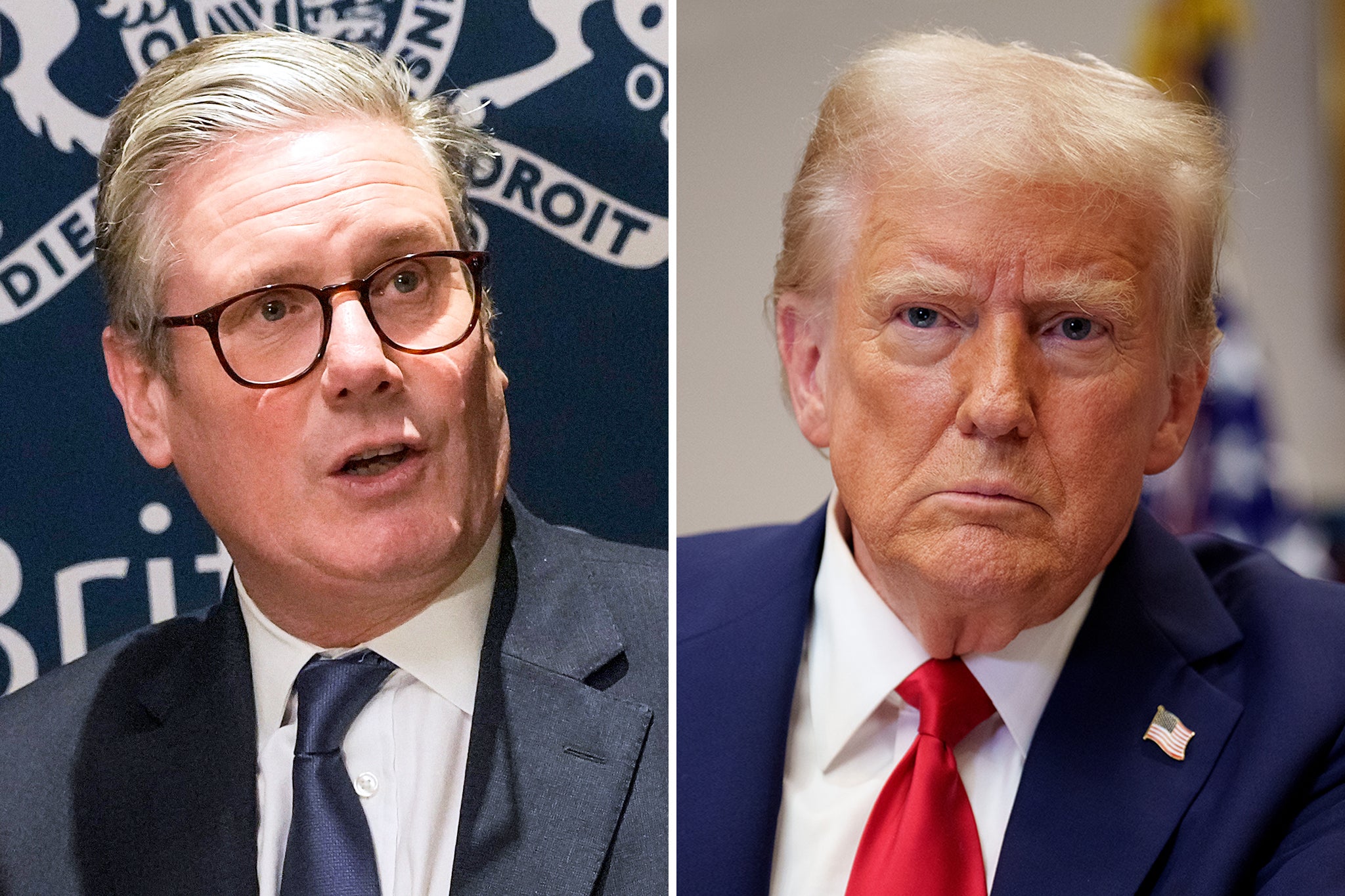
Both the UK and the European Union have faced trade threats from president Donald Trump, who this week oscillated on tariffs for China, Canada, and Mexico.
Tariffs on UK goods exported to the United States may still be on the cards, though Mr Trump has said a deal “can be worked out” - but an EU tariff decision is “going to be pretty soon”.
Yet as Mr Trump wields the threat of tariffs on UK exports, just how high is the UK’s dependence on the US?
The latest trade figures (year up to November 2024) show that UK goods trade with the US (£113.7bn) is over four times smaller than with the EU (£484.9bn), even after Brexit.
The US is the UK’s largest single trading partner, although the UK imports more goods, including things such as food, cars, machinery and medicines from Germany.
The UK reports it is in a trade surplus with the US, meaning that exports are bigger than imports. Meanwhile, the US reports the trade surplus is reversed; this discrepancy is largely due to different methods of measuring services trade.
The UK’s trade relationship with the US is most reliant on the exchange of services, with exports to the US valued at £129bn in the 12 months to 2024 alone. This ranges from business services and financial services to tourism.
However, the possible tariffs would only apply to goods imported from the UK, where it is slightly less dependent on US trade.
Although the UK still imports a large amount of goods from the US (£56.3 billion), its highest single trading partner is Germany (£71.6 bn). As a bloc, EU imports are nearly six times higher at £309.8bn in total.
When it comes to exported goods - which would be most affected if Mr Trump began a trade war - the UK exported £57 billion in the 12 months to November, and triple that number to the EU, at £175 billion.

“Could better relations between the UK and EU help offset some of the pain from tariffs? Yes. Economically, there is no doubt that closer UK-EU ties can help offset some of the damage,” David Henig, UK trade expert, told The Independent.
But Mr Henig, director of the UK Trade Policy Project, also suggests Mr Trump’s tariff threats will also put a strain on the UK-EU relationship.
He said: “It would be very difficult for the UK and EU to coordinate under US tariffs. Mr Trump likes to play ‘divide and rule’ and everybody would be nervous. There would be conversations but it would all be quite cautious.”
Prime minister Sir Keir Starmer indicated on Monday in Brussels that the UK should not have to choose between the US and the EU, saying: “In relation to the US and the EU, or Europe more generally, if you look at our vital interests, it's really important that we work with both and we don't see it as an either/or.”
Yet while Mr Trump has suggested that the UK might be safer than the EU from future tariffs, he repeated this week that the “UK is way out of line”.
The number one goods export to the US are cars, worth £8.3 billion in the year up to November 2024. The US is also the top buyer of British-made cars, meaning brands such as Land Rover and Aston Martin could feel the squeeze from tariffs.
Though Jaguar Land Rover (JLR) now manufactures cars in multiple countries, the Range Rover and several offshoots are still built at their Solihull plant in the UK.
The car manufacturer is already facing global pressure from tariffs, with its Defender and Discovery models made in the EU, while China threatened tariffs on JLR’s Defender last year in retaliation for the EU’s EV tariffs.

Meanwhile, reports suggest up to 200 workers at JLR’s Halewood manufacturing plant near Liverpool have been offered voluntary redundancy by the end of the year.
The UK’s scientific industries are also heavily reliant on the US as an export destination, particularly pharmaceutical companies.
Nearly a quarter of all scientific instruments exported from the UK are sent to the US, amounting to £2.4 billion in exports in the year up to November 2024.
When it comes to medicinal and pharmaceutical companies in the UK, a third of all exports head to the US, worth around £7.3 billion a year.
Though smaller overall, the alcohol industry will also be under threat, in particular Scotland’s world-famous whisky. At present, 16 per cent of the UK’s beverages and tobacco exports are sent to the US.
Whiskey is the UK’s number one food and drink export overall, with £2.8 billion exported worldwide in the first nine months of 2024 alone, according to the Food and Drink Federation (FDF).
A substantial £558 million of this UK-made whisky was exported to the US, yet FDF data shows that this is already in decline by 23.2 per cent from the previous year.
Meanwhile, gin exports to the US sank by 38.1 per cent in value to £81 million.
The alcohol industry’s reliance on US markets, whose purchases are already in decline, means that possible trade tariffs could have a significant financial impact on the industry.
This would also affect Scottish Salmon, the UK’s largest food export, of which approximately one-fifth is exported to the US.
However, France is the largest single buyer of Scottish Salmon, taking over half of all exports in 2023.
The US is also the top buyer of gas turbines from the UK, buying $3.65 billion (£2.92 billion) worth in 2022, according to the Observatory of Economic Complexity (OEC).
On this front, both the UK and EU may be at risk, with the US also buying large quantities of gas turbines from France and Germany.
The US needs reliable supplies of gas turbines, particularly in light of Mr Trump’s “drill baby drill” battle cry to prioritise oil and gas over renewable energy sources.
There is already homegrown capacity across the pond, with General Electric a world leader in gas turbines. Yet the US still imports billions of gas turbines each year from worldwide distributors.
Siemens, a German-based company with UK subsidiaries, which is one of the largest gas turbine manufacturers globally, told The Independent that it is “watching closely” for how tariffs take shape.
“We know the US administration is committed to more American manufacturing, and we think our technology is well-positioned to support the US industrial base. With a balanced global footprint, we have taken strong steps to localise manufacturing. We are watching closely how tariffs are implemented.”
Retaliations and machinations
Though tariffs would have the most impact on goods exports, the UK is also reliant on imported goods from the US.
It is possible that the UK would implement retaliatory tariffs on US goods, which would revive an EU-era package from when Mr Trump first placed levies on European steel.
These could include iconic American brands such as Calvin Klein, Levi jeans, and Jack Daniel’s whiskey.
The tariffs would likely be more symbolic than economically damaging for most US exporters, with major import sectors from the US left untouched.
“My expectation is that any UK retaliation would be more symbolic,” explained Mr Henig. “The UK government wouldn’t want to get into a full-on trade conflict with the US, and I think we’re trying to avoid that on the whole.”

This likely includes specific industries where the UK’s reliance on good relations with the US is particularly high; approximately a quarter of its fuel imports come from the States - essential for the UK’s energy security.
The US is a top import destination of gas, behind only Norway, in the form of liquid natural gas. With 40% of the UK’s energy mix still made up of gas, the UK cannot afford to lose this resource from the US.
By comparison, the US has more valuable oil and gas relationships with Canada, Mexico, China, and Japan, according to the OEC. This means it would be far less affected by reverse tariffs from the UK.
Not only would American gas most likely be safe from reverse tariffs, but the UK may plan to buy up even more of the natural resource to “curry favour” with Mr Trump, according to reports in Politico.
This arrangement would be mutually beneficial since diminishing production in the North Sea and the move away from Russian gas has left the UK with fewer options.
President Trump has all but laid out American gas as a route out of a trade was, saying that “the one thing [the EU] can do quickly is buy our oil and gas” to avoid heavy tariffs.
A closer EU-UK trade alliance?
The EU would most likely face a heavier negative impact from tariffs than the UK; particularly since it is in a trade surplus with the US, and because the UK exports a higher proportion of services than goods.
The UK voted by a hairline to leave the EU in 2016, and Britain fully withdrew from the EU between 2020 and 2021.
Yet the two blocs still enjoy a strong trade relationship and many of the industries which could be affected by Trumpian tariffs are also heavily exported to the EU.
The UK exports high amounts of chemicals (£30.2 billion) and fuels (£28.5 billion) to the EU.
Exports to the EU across machinery and transport, and mechanical machinery totalled £93.3 billion in 2023 alone, before even including other manufacturing exports.
The UK also exported £9.8 billion in medicinal and pharmaceutical goods to the EU in that year, ahead of the US (£8.8 billion).

In all major fields, the EU imports more UK products than the US, to varying degrees.
Trade expert Mr Henig suggests tariff threats will not necessarily force the EU and UK closer together, possibly making the two economies hesitant to inflame the situation.
“The presence of Trump and his coercion does not necessarily help UK and EU relations - arguably, it makes them harder,” he told The Independent.
Most of all, according to Mr Henig, the UK doesn’t have time to work on its relationship with the EU.
“Trump is taking up all of our time, in the UK and the EU. There is less time to work on relations with each other. There’s already a lot of caution and Trump just adds more complication.”
However, Mr Henig still believes increasing trade with the EU could soften the blow for both parties if Mr Trump follows through with tariff threats.
A UK government spokesperson said: "The US is an indispensable ally and one of our closest trading partners, and we have a fair and balanced trading relationship which benefits both sides of the Atlantic.
"We look forward to working closely with President Trump to continue to build on UK-US trading relations for our economy, businesses and the British people.”







